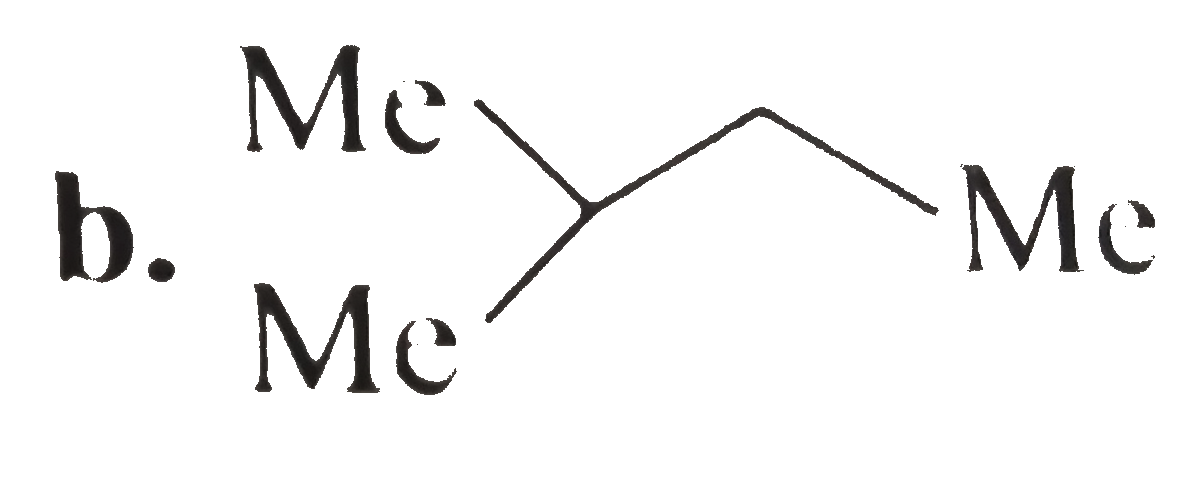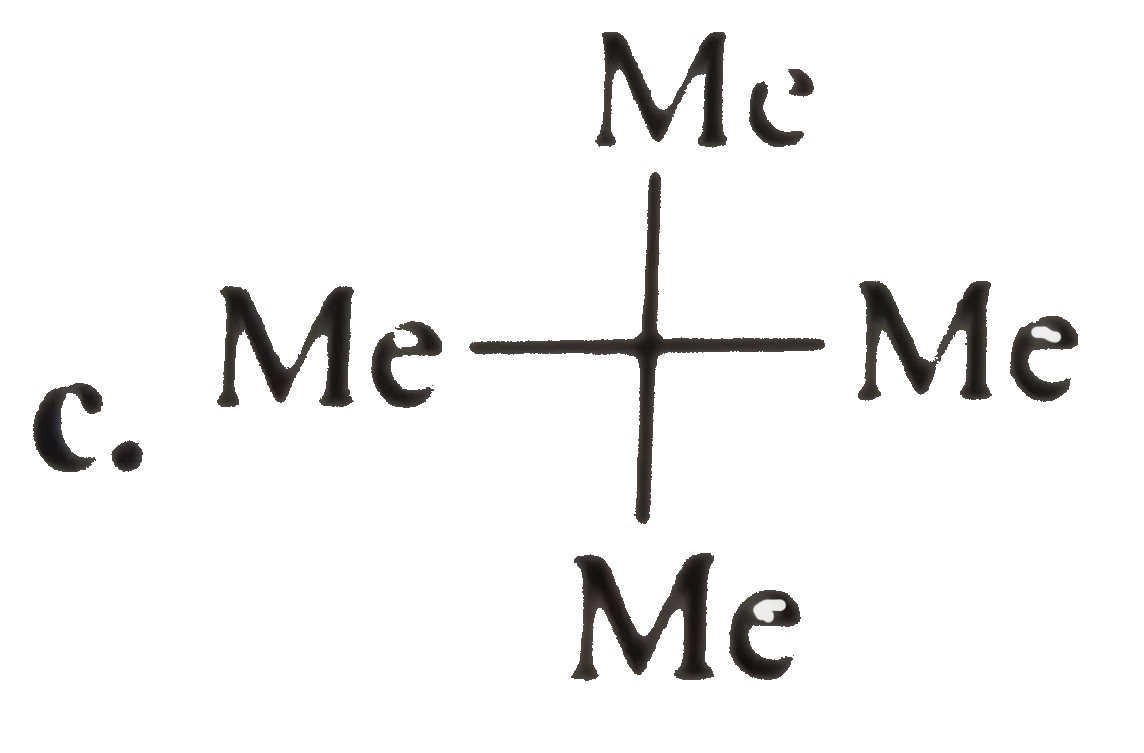An alkane (A) having a molecular mass of 72 produces one monochlorination product. Compound (A) is:




The correct Answer is:C
To solve the problem of identifying the alkane (A) with a molecular mass of 72 that produces only one monochlorination product, we can follow these steps:
Step 1: Determine the molecular formula of the alkane
The general molecular formula for alkanes is given by:
\( C_nH_{2n+2} \)
Where \( n \) is the number of carbon atoms.
Step 2: Set up the equation based on the molecular mass
The molecular mass of carbon (C) is 12 g/mol and that of hydrogen (H) is 1 g/mol. Therefore, the molecular mass of the alkane can be expressed as:
\( \text{Molecular mass} = 12n + (2n + 2) \)
Given that the molecular mass is 72, we can set up the equation:
\( 12n + 2n + 2 = 72 \)
This simplifies to:
\( 14n + 2 = 72 \)
Step 3: Solve for \( n \)
Subtract 2 from both sides:
\( 14n = 70 \)
Now divide by 14:
\( n = 5 \)
Step 4: Write the molecular formula
Using the value of \( n \):
\( \text{Molecular formula} = C_5H_{2(5)+2} = C_5H_{12} \)
Step 5: Identify possible structural isomers
The alkane with the formula \( C_5H_{12} \) can exist in several structural forms (isomers). The possible isomers are:
1. Pentane (n-pentane)
2. Isopentane (2-methylbutane)
3. Neopentane (2,2-dimethylpropane)
Step 6: Analyze monochlorination products
Monochlorination of these isomers will yield different products:
- n-Pentane: Can produce 3 different monochlorination products.
- Isopentane: Can produce 4 different monochlorination products.
- Neopentane: All hydrogen atoms are equivalent, leading to only 1 unique monochlorination product.
Conclusion
Since we need an alkane that produces only one monochlorination product, the compound (A) must be neopentane (2,2-dimethylpropane).
Final Answer
Compound (A) is neopentane (C5H12).
---
The general molecular formula for alkanes is given by:
\( C_nH_{2n+2} \)
Where \( n \) is the number of carbon atoms.
The molecular mass of carbon (C) is 12 g/mol and that of hydrogen (H) is 1 g/mol. Therefore, the molecular mass of the alkane can be expressed as:
\( \text{Molecular mass} = 12n + (2n + 2) \)
Given that the molecular mass is 72, we can set up the equation:
\( 12n + 2n + 2 = 72 \)
This simplifies to:
\( 14n + 2 = 72 \)
Subtract 2 from both sides:
\( 14n = 70 \)
Now divide by 14:
\( n = 5 \)
Using the value of \( n \):
\( \text{Molecular formula} = C_5H_{2(5)+2} = C_5H_{12} \)
The alkane with the formula \( C_5H_{12} \) can exist in several structural forms (isomers). The possible isomers are:
1. Pentane (n-pentane)
2. Isopentane (2-methylbutane)
3. Neopentane (2,2-dimethylpropane)
Monochlorination of these isomers will yield different products:
- n-Pentane: Can produce 3 different monochlorination products.
- Isopentane: Can produce 4 different monochlorination products.
- Neopentane: All hydrogen atoms are equivalent, leading to only 1 unique monochlorination product.
Since we need an alkane that produces only one monochlorination product, the compound (A) must be neopentane (2,2-dimethylpropane).
Compound (A) is neopentane (C5H12).
Topper's Solved these Questions
- CLASSIFICATION AND NOMENCLATURE OF ORGANIC COMPOUNDSBOOK - CENGAGE CHEMISTRY ENGLISHCHAPTER - CLASSIFICATION AND NOMENCLATURE OF ORGANIC COMPOUNDSEXERCISE - Assertion-Reasoning Type
5 Videos
- CLASSIFICATION AND NOMENCLATURE OF ORGANIC COMPOUNDSBOOK - CENGAGE CHEMISTRY ENGLISHCHAPTER - CLASSIFICATION AND NOMENCLATURE OF ORGANIC COMPOUNDSEXERCISE - Fill in the Blanks Type
5 Videos
- CLASSIFICATION AND NOMENCLATURE OF ORGANIC COMPOUNDSBOOK - CENGAGE CHEMISTRY ENGLISHCHAPTER - CLASSIFICATION AND NOMENCLATURE OF ORGANIC COMPOUNDSEXERCISE - Multiple corrcct Answers Types
11 Videos
- CHEMICAL EQUILIBRIUMBOOK - CENGAGE CHEMISTRY ENGLISHCHAPTER - CHEMICAL EQUILIBRIUMEXERCISE - Subjective type
1 Videos
- GENERAL ORGANIC CHEMISTRYBOOK - CENGAGE CHEMISTRY ENGLISHCHAPTER - GENERAL ORGANIC CHEMISTRYEXERCISE - Analytical and Descriptive
1 Videos
Similar Questions
Lipids have a molecular mass of :
View SolutionA compound (A) with molecular formula C5H10 gives one monochlorination product. Compound (A) is:
View SolutionAn alkane by molecular weight 72 upon chlorination gives one monochlorination product. The alkane is
View SolutionAn alkane of molecular weight 86 g/mol on monochlorination gives two products. The alkane is
View SolutionWrite the IUPAC name of the compound (A) which is a 2-methy1 branched alkane having a molecular mass of 254. This compound is a sex-attractant and is isolated from female tiger moths.
View SolutionThere are six isomeric alkenes (A, B, C, D, E, and F) that require 1 mol of H2 per mole of alkene for hydrogenation and give the same product (G) on hydrogenation. G is an alkane having the lowest molecular mass and is optically active. Write the structure of compounds from A to G.
View SolutionWhich alkane, having a molecular weight of 86, will form only two monobromo alkanes?
View SolutionWhich of the folloiwng alkanes will give more than one monochloro product?
View SolutionAn organic compound with molecular formula C6H12 upon ozonolysis gives only acetone as the product. The compound is :
View SolutionGive the structure of an optically active alkene (A) having the lowest molecular mass, which on catalytic hydrogenation gives an optically inactive compound (B).
View Solution
